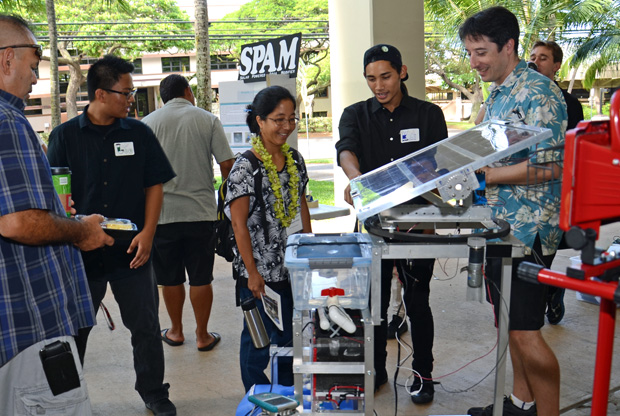
The 4th Annual Indigenous Knowledge in Engineering (IKE) Student Symposium held on August 15, 2015 focused on hōʻike, meaning culminating demonstration. The IKE program helps promote Native Hawaiians in engineering. Students who presented at the symposium completed a summer engineering experience, finished a pre-engineering math emporium course and a completed a hands-on engineering or research project over the academic year and/or summer. These projects showcased how to improve the STEM-based workforce in Hawaiʻi.
Poster and presentation winners
- Estimating Battery Life Based on the Power Consumption of a Remotely Operated Underwater Robot (Sea Perch)
Advisors: Justin Carland and Jacob Tyler
Students: Kapono Naeole-Nahulu, Christopher Parish, Tearanui Kepoʻokalani - Hexacopter
Advisor: J Park
Students: Tyler Ciccone, Jarren Endrina, Jarret Kahookele - Solar Powered Aqua Modifier (S.P.A.M)
Advisors: Norman Takeya, Milton Lau,Travis Takashima
Authors: Jasmine Hoapili, Danny Tubera, Justin Barrowcliff, Ashley Magno, Blake Calderon, Rochelle Pagaduan, Joseph Peralta, Kay Hashimoto, Kalawaia Kamai, Gerson Previl - Landslide Early Warning System (LEWS)
Authors: Wyatt Bartlett and John Nihi
Advisor: Dr. Phillip Ooi Mentors: Melia Iwamoto, Marica Otto - Fashionable Tech in Cosplay
Author: Jessica Blankenship Grazziotin
Mentors: Ed Kim, Noah Hafner, Aisis Chen - A Novel Algal Bioreactor for Wastewater Treatment and Biofuel Production
Authors: Chad Morrow and Valerie Smith
Faculty Advisor: Dr. Eunsang Kan

About IKE
IKE is a six-campus University of Hawaiʻi System collaboration focused on the development of a pre-engineering pathway in the community colleges. This effort specifically focuses on developing a framework supportive of Native Hawaiian students in pursuit of engineering careers. Native Hawaiians and other minority groups are consistently underrepresent¬ed in modern science and engineering fields; the intent of IKE is that through the evolution of successful pre-engineering programs in the UH system, we will gain insights on engineering education practices effective for indigenous students that may be applied to other indigenous-serving higher education institutions and to other programs.
For more information, visit the IKE website.

